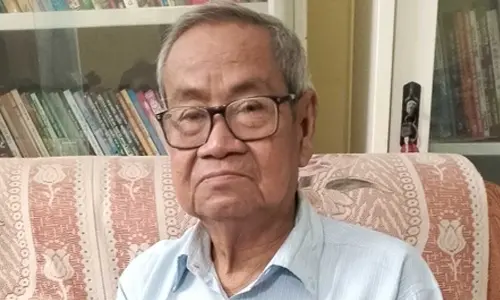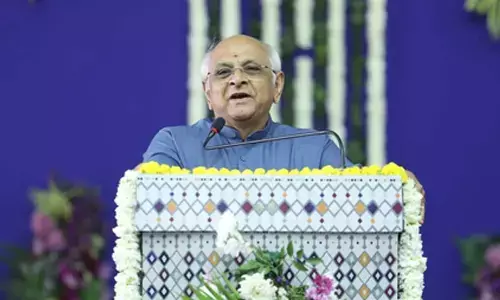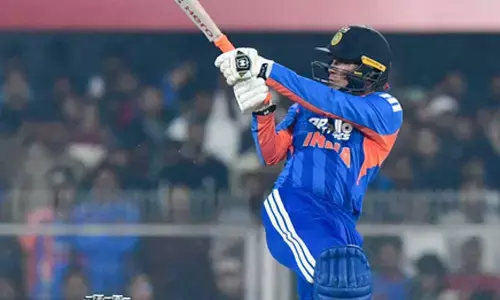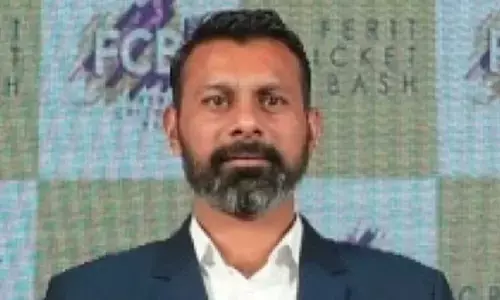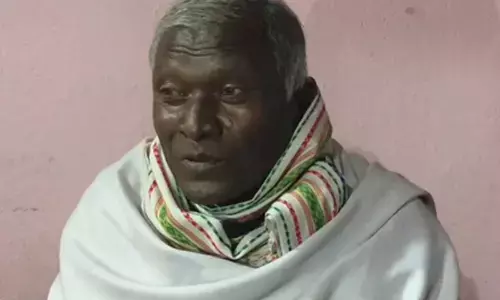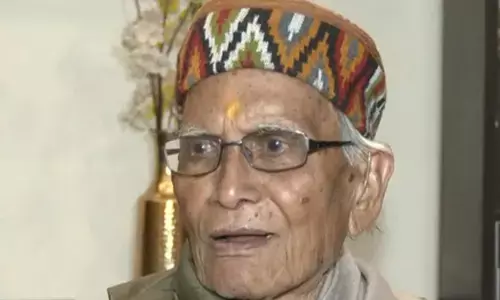Two gems and the Bharat Ratna
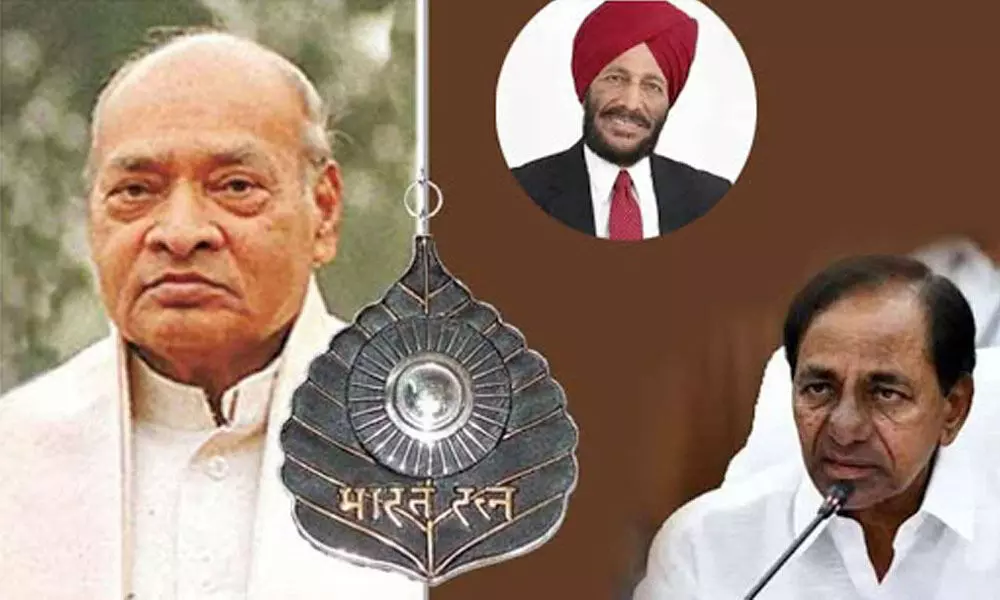
Two gems and the Bharat Ratna
The qualities of trendsetters, myth-busters and torchbearers are unique
The qualities of trendsetters, myth-busters and torchbearers are unique. They try something new under trying circumstances and discover a new path to success off the beaten tracks for the benefit of the motherland. The little bold steps they take with supreme conviction leads to massive results ensuring them a place in the history.
One was the 'saint on the throne', the other 'the 'monk on the track'. The duo stormed rough weathers and troubled waters with self-belief and dogged determination to see their national flag fly high. They instilled a mountain of confidence in their compatriots with their impressive performance and contribution to the common good. More's the pity, these national stalwarts' colossal contribution in their chosen field was not properly recognised when they were alive and kicking.
This is the story of India's neglected heroes, 'The Father of Indian Economic Reforms' Pamulaparthi Venkata Narasimha Rao (28 June 1921 – 23 December 2004) and 'The Flying Sikh' Milkha Singh (20 November 1929 – 18 June 2021), who deserve to be bestowed with the Bharat Ratna, the highest civilian award of the Republic of India. The award, instituted on 2 January 1954, was originally limited to achievements in the arts, literature, science and public services but was expanded to include"any field of human endeavour" in 2011. Both the gems fit the bill of "exceptional service/performance of the highest order" without an iota of doubt.
PV's political acumen and administrative dexterity is often compared with that of Jawaharlal Nehru. While the first Prime Minister led free India to set its foot on the path of development, the 10th Prime Minister gave the muscle and strength to stand on its own and run fast to catch up with the world.
PV earned a name for causing a paradigm shift from Nehru's industrialising, mixed model to a market-driven economy by roping in an apolitical economist Manmohan Singh as his Finance Minister. His biggest success also lies in royally running a ragtag minority government for a full-term while taking the opposition, driven by a diametrically different ideology, into confidence.
The Land Ceiling Act he brought in the erstwhile Andhra Pradesh is a watershed in Indian social and political landscape. Nehru (in 1955), his daughter Indira (1971) and her son Rajiv (1991) were conferred with the most coveted award for their contributions, no issues. But, Indira and Rajiv do pale in comparison with PV's experience, maturity, statesmanship, penchant for reforms any day. As Sanjay Baru, author of an insightful book '1991: How PV Narasimha Rao Made history', mentioned PV pursued reform through implicit, if not explicit, consensus building as the 'middle path' that was successfully emulated by Vajpayee and Manmohan Singh. Baru rightly observed that the 'middle path' approach serves India's plural democracy better than brute majority.
Natwar Singh, a former Foreign Secretary, once observed: "Unlike Nehru, PV's knowledge of Sanskrit was profound. Nehru had a temper, PV a temperament. His roots were deep in the spiritual and religious soil of India. He did not need to 'Discover India'". The Missile Man and 11th President of India, APJ Abdul Kalam described PV as a "patriotic statesman who believed that the nation is bigger than the political system". India has never produced and probably can't produce such a versatile politician like PV who had interests in a variety of subjects such as journalism, literature, arts and computer software. His love for languages (spoke 14), literature (authored books) and sports (Tennis) is unmatchable.
Telangana paid glowing tribute to its beloved son-of-the-soil by way of grand centenary celebrations that concluded on June 28. The year-long celebrations culminated with the unveiling of a 26-foot bronze statue of PV on the Necklace road (christened as PV Marg) of Hyderabad for which the Telangana Rashtra Samithi government led by K.Chandrasekhar Rao deserves kudos. The 'Mouna Muni' (silent monk), a moniker PV earned for his spirituality, simplicity and taciturnity, faces the Lord Buddha's statue erected in Hussainsagar Lake.
The colossal leader from Telangana, PV, sadly, is left with no major civilian award. The Congress-led UPA government had not entertained a resolution passed by the united Andhra Pradesh Assembly seeking Bharat Ratna for PV for obvious reasons. It is too much to expect from the party that humiliated PV at his twilight and dishonoured him soon after his demise.
Interestingly, KCR has done what the Congress failed to do. He conducted the centenary celebrations in a grand scale notwithstanding the unsavoury environment caused by Covid-19. The TRS chief perhaps drew some inspiration from his political mentor NT Rama Rao in bestowing full honours to PV, the pride of Telugus, irrespective of political ideologies.
NTR rose to power on the plank of 'Telugu self-respect' following the ill-treatment meted out to the successive Chief Ministers by the Congress high command but he mellowed down his loath against the same party when it came to PV.
In the by-election for Nandyal Parliamentary Constituency, NTR, being the leader of the then opposition Telugu Desam Party, opted his party out of the race to ensure the Prime Minister PV's smooth sail in 1991. Thanks to the grand gesture of NTR, the Prime Minister secured 89.48 percent of polled votes and won the seat with a margin of about five lakh votes to enter the Guinness book of records.
After the Telangana Assembly adopted a resolution asking the Centre to confer the prestigious Bharat Ratna on PV, in September 2020, KCR said Nehru laid the foundation stone for a "modern India" while PV was the creator of "global India." As a follow up to the Assembly resolution, a TRS MP, Banda Prakash, participating in the motion of thanks to the President's address in Rajya Sabha in February 2021, asked the Centre to confer the Bharat Ratna on PV. By now, as many as 81 Telugu Non-Resident Indian organisations across the world launched a joint campaign for mobilising public support to request the GoI to confer the country's highest civilian award to PV.
Unlike the inaugural, much to my surprise, the centenary celebrations concluded without making a vociferous demand to confer Bharat Ratna on PV. The go-getter KCR limited his speech only to highlight the greatness of PV and the Governor, the Chief Guest, too echoed the same. Would it be wishful thinking to assume that Modi, who praised PV as 'great son of India' in one of the recent 'Man ki Baat' programmes, asked KCR to leave the issue to him without making much ado. It is, however, disheartening to see the deferment of the release of a commemorative stamp on PV by the Postal Department at the last minute on Monday.
On sports front, Milkha Singh, who passed away due to Covid-19 this month at the age of 91, too deserves the Bharat Ratna for his legendary performance in the field of track and field. Milkha, who was bestowed with the Padma Sri in 1959 and Arjuna in 2001, used to say that he would have been happier with Padma Bhushan, the third highest award, for lifetime achievement. The cricket-fanatic nation conferred Bharat Ratna on Sachin Tendulkar grossly ignoring sporting titans like Dhyan Chand and Milkha Singh.
PV shied away from talking about awards and rewards but the outspoken Sardar came out in the open on this issue. With due respects to Sachin's cricketing talent, Milkha went on record that the hockey wizard Dhyan Chand should have been the first sportsperson to be conferred with the country's highest civilian award. Very true, Dhyan Chand powered India to three Olympic Gold medals in 1928, 1932 and 1936 and laid a strong foundation for Hockey India.
A trendsetter in Indian athletics, Milkha achieved unthinkable by finishing fourth in the 400m at the 1960 Rome Olympic Games, missing the bronze in a photo finish besides winning more than 70 international medals. What matters here is, not the Olympic medal but the Milkha's success in busting a rock-hard myth that Indians are not cut for track and field. A victim of partition-time mayhem and adversities, Milkha rose to become an iconic athlete India ever produced in the absence of proper infrastructure. No other veteran sportsperson campaigned for a drug-free, unbiased and clean sports like Milkha.
Ideally, awards are meant to honour living legends in recognition of their contribution or service to the nation. But, more than dozen proud citizens of India got the most coveted Peepal leaf-shaped medallion after their demise. History will not absolve the Modi government if it fails to consider PV and Milkha for Bharat Ratna at least posthumously now.
(The author, a PhD in Communication and Journalism, is a senior journalist, journalism educator and communication consultant)








